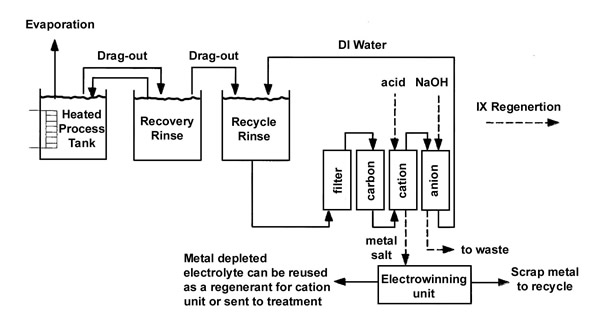| Presented in Partnership with: | |||
 |
 |
 |
 |
Pollution Prevention
Ask the Expert Question-and-Answer Archiveby George Cushnie
April, 2008Zero Discharge System
Q. I would like to have a zero discharge system for Cu plating line. What would you suggest? I can send the bath sequence.
A. Zero discharge is a relative term. For most metal finishers it means no discharge of wastewater to a sewer system or water course. Inherent in that definition is the generation of a concentrated liquid or solid waste that must be disposed of. There are always some impurities in plating processes that must be removed from the process at some point and these can be troublesome and expensive to deal with.
For copper plating, "zero discharge" can be achieved, although it is usually not cost-effective unless there are unusual circumstances, such as very high sewer discharge fees. The most reliable method is a combination of ion exchange (IX) (deionization -- both anion and cation removal) and electrowinning (EW) (see attached figure). A dragout rinse is used to recover the bulk of the copper and therefore allows for installation of smaller and less expensive IX and EW recovery equipment. The ion exchange unit, which is best applied to dilute rinse waters, maintains a low metal concentration in the final rinse. The ion exchange unit concentrates the metal into a regenerant stream and the electrowinning unit removes the metal.
This system will recover the copper, which can be taken to a scrap dealer, and return the rinse water to the plating line. This system will also produce a significant volume of regenerant that will need to be hauled off-site or completely evaporated. Dealing with the regenerant can be very expensive.
In addition to the plating process, you will also need to deal with alkaline cleaning and acid etching rinse waters. There is not much else you can do with these other than evaporation and hauling.
Please let me know if this information is useful.
Regards,
George Cushnie
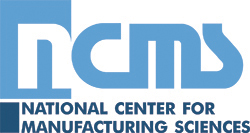 |
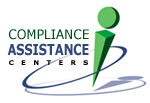 |
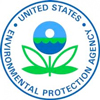 |
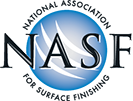 |
 |
| Home | Subscribe | Regulations | Compliance Assistance | News | Resources | Resource Locators | Directories | Online Training | About | Search | NASF.org |
The information contained in this site is provided for your review and convenience. It is not intended to provide legal advice with respect to any federal, state, or local regulation.
You should consult with legal counsel and appropriate authorities before interpreting any regulations or undertaking any specific course of action.
Please note that many of the regulatory discussions on STERC refer to federal regulations. In many cases, states or local governments have promulgated relevant rules and standards
that are different and/or more stringent than the federal regulations. Therefore, to assure full compliance, you should investigate and comply with all applicable federal, state and local regulations.
